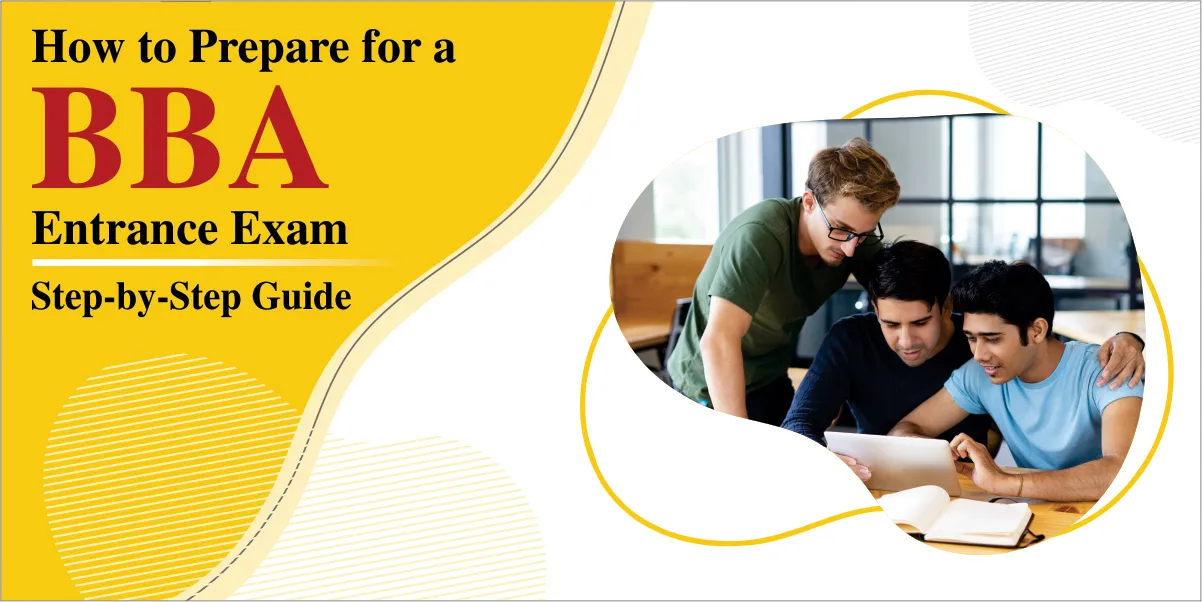


30,December 2024
Preparing for a BBA (Bachelor of Business Administration) entrance exam requires a strategic approach that focuses on developing key skills, mastering essential concepts, and managing time effectively. These exams typically assess a candidate’s aptitude in areas like quantitative ability, logical reasoning, English language proficiency, general knowledge, and business awareness. To succeed, students need to understand the exam pattern, create a personalized study plan, and consistently practice problem-solving techniques. Additionally, focusing on improving speed and accuracy through mock tests and sample papers can significantly enhance performance. Effective time management, staying updated on current affairs, and honing communication skills are equally important aspects of the preparation process. With the right preparation strategy, candidates can boost their chances of securing a seat in a prestigious BBA Course.
A BBA Entrance Exam is a gateway for students aspiring to pursue a Bachelor of Business Administration, a popular undergraduate course in management. These exams are designed to evaluate a student’s skills in areas like quantitative aptitude, logical reasoning, general awareness, and verbal ability. Conducted by universities and colleges across India, the exam serves as a selection criterion for admission into prestigious BBA programs.
Key features of BBA Entrance Exams:
Clearing a BBA entrance exam not only grants access to quality education in business administration but also prepares students for leadership roles in the corporate world.
BBA Entrance Exams play a crucial role in shaping the academic and professional future of students aiming to pursue a career in management. Here’s why these exams are important:
Overall, BBA Entrance Exams not only help in selecting the right candidates but also serve as an initial step in preparing students for the dynamic world of business.
BBA Entrance Exams typically assess a student’s aptitude, reasoning, and general knowledge to determine their readiness for business studies. While the specific pattern and subjects may vary by college or university, there are some common elements that most exams share.
Understanding the common subjects and exam patterns helps candidates prepare effectively and perform well in BBA Entrance Exams.
A well-structured study plan is crucial for effective preparation for a BBA entrance exam. It helps in managing time, staying organized, and ensuring that all topics are covered thoroughly. Here’s a guide to help you set up an efficient study plan:
A strong foundation is key to performing well in any competitive exam, and the BBA entrance exam is no exception. To succeed, it is essential to focus on building your fundamental knowledge and skills in the subjects that are typically tested in the exam, such as Quantitative Aptitude, Logical Reasoning, English Language, and General Knowledge. Here’s how you can go about creating a solid base for your BBA entrance exam preparation:
Strengthening Basics - The stronger your fundamentals, the easier advanced topics will seem.
Importance of NCERT Books - NCERT books are excellent for clarifying concepts, especially in mathematics. Start here before moving on to advanced material.
Solving Past Papers - Nothing beats practice when it comes to exams.
Identifying Question Patterns - Look for recurring themes in past papers. Are there specific types of questions that show up every year? Prioritize those.
Preparing for key subjects is essential for academic success and requires a focused and well-structured approach. By understanding the syllabus, organizing resources, and maintaining a consistent study routine, students can ensure they cover important topics effectively. A strategic preparation plan helps in managing time efficiently and boosts confidence during exams.
Utilizing resources effectively is a cornerstone of successful learning and preparation. With access to a wide range of tools such as textbooks, online platforms, and expert guidance, students can enhance their understanding of complex topics and gain a competitive edge. Proper resource management ensures a comprehensive grasp of subjects and saves time during preparation.
Recommended Books for BBA Exams - Books like Quantitative Aptitude by R.S. Aggarwal and Word Power Made Easy by Norman Lewis are go-to resources.
Online Study Platforms and Apps - Platforms like Unacademy, BYJU'S, and Khan Academy offer excellent prep courses. Apps like Gradeup can be useful for practice.
Practicing regularly is vital for mastering any subject or skill. It reinforces learning, builds confidence, and helps identify weak areas. Consistent practice not only improves understanding but also enhances speed and accuracy, which are crucial for academic and competitive success.
Importance of Mock Tests - Mock tests simulate the actual exam and help you gauge your preparation.
How to Analyze Your Performance - After each test, review your mistakes and note areas for improvement. This helps you focus your efforts where they’re needed most.
Overcoming Test Anxiety - Test anxiety is common but manageable. Practice deep breathing and stay positive.
Staying motivated and healthy is essential for maintaining focus and achieving success in academics or any endeavor. Motivation drives consistent efforts, while good health ensures physical and mental well-being, enabling individuals to perform at their best. A balanced approach to work and self-care is key to long-term productivity and satisfaction.
Avoiding Burnout - Don’t overdo it. Studying for 10 hours a day isn’t sustainable. Stay consistent instead.
Healthy Eating and Exercise Routines - Eat brain-friendly foods like nuts and fruits. Include light exercise or yoga in your daily routine to keep stress levels low.
Exam day strategies are crucial for maximizing performance and minimizing stress. A well-planned approach helps in managing time, staying focused, and answering questions effectively. These strategies ensure that all preparation efforts culminate in a successful outcome.
Managing Time during the Exam - Start with sections you’re confident about. Allocate time to each section and stick to it.
Reviewing Answers Effectively - If time permits, double-check your answers to avoid silly mistakes.
Preparing for a BBA entrance exam might seem daunting, but with a clear plan, the right resources, and consistent practice, you can ace it. Believe in yourself, stay focused, and remember—this is just the beginning of your journey to success.